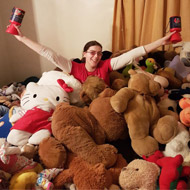
Megan Whiteman suffers from ornithophobia
An online fundraiser with a bird phobia has raised more than £25,000 to help to save hens from slaughter.
Megan Whiteman from Nuneaton set up her eBay shop in 2013 and by 2016 had raised over £12,000. In just two years she has more than doubled that figure and donated all proceeds to the British Hen Welfare Trust.
She was inspired to raise funds for the charity after falling in love with some ex-battery hens that her mother had re-homed. But Megan hasn’t always been such a fan of feathered animals.
“I was pretty terrified,” she said. “I didn't realise it was quite so bad until the hens arrived actually. Aggie, one of our less well-adjusted girls, started to fly at the gate for food every time I went out. After about two days of nightmares (including one where I thought they'd invaded the bedroom!), I got totally used to them.
“I then learnt my great grandmother had a phobia of birds too, as well as my aunt, whose particular horror revolved around geese. One of my other hens, Bunty, helped a lot; she was like a chicken version of me, so we bonded really quickly. She was bossy and food mad!”
A fear of birds is known as ornithophobia and makes sufferers extremely uncomfortable in their presence. It is a common fear that is thought to affect around one in 10 people at least once in their lifetime.
Megan’s drive to help as many hens as she could meant that she wasn’t surprised to hit the £25,000 mark. “The hens need as much money as possible so I can't afford to fail really,” she said.
Visitors to Megan’s eBay shop can expect to find anything from cuddly toys and pet treats to books and rare paintings. Yet to be sold is a Disney bear worth £500, which is one of her most expensive items to date.
Image (C) British Hen Welfare Trust



 The Federation of Independent Veterinary Practices (FIVP) has announced a third season of its podcast, Practice Matters.
The Federation of Independent Veterinary Practices (FIVP) has announced a third season of its podcast, Practice Matters.